Yes, bunnies can safely snack on celery, but it should be introduced carefully into their diet. This article delves into the right way to feed celery to rabbits, important nutritional info, and potential risks to watch for. By the end, you’ll know how to responsibly incorporate celery into your bunny’s meals, answering the question: can bunnies eat celery?
Key Takeaways
- Celery can be added to a rabbit’s diet as it’s packed with nutrients and hydration, but it should be introduced gradually and given in moderation to prevent digestive upset.
- Preparation is key when giving rabbits celery; the strings should be removed and the veg cut into small pieces to avoid choking hazards, and only certain parts like stalks and leaves are safe for consumption.
- A balanced diet for rabbits should focus on hay, with celery and other fresh veggies as complementary snacks, ensuring nutritional variety and preventing overreliance on any one food type.
Can Bunnies Safely Consume Celery?
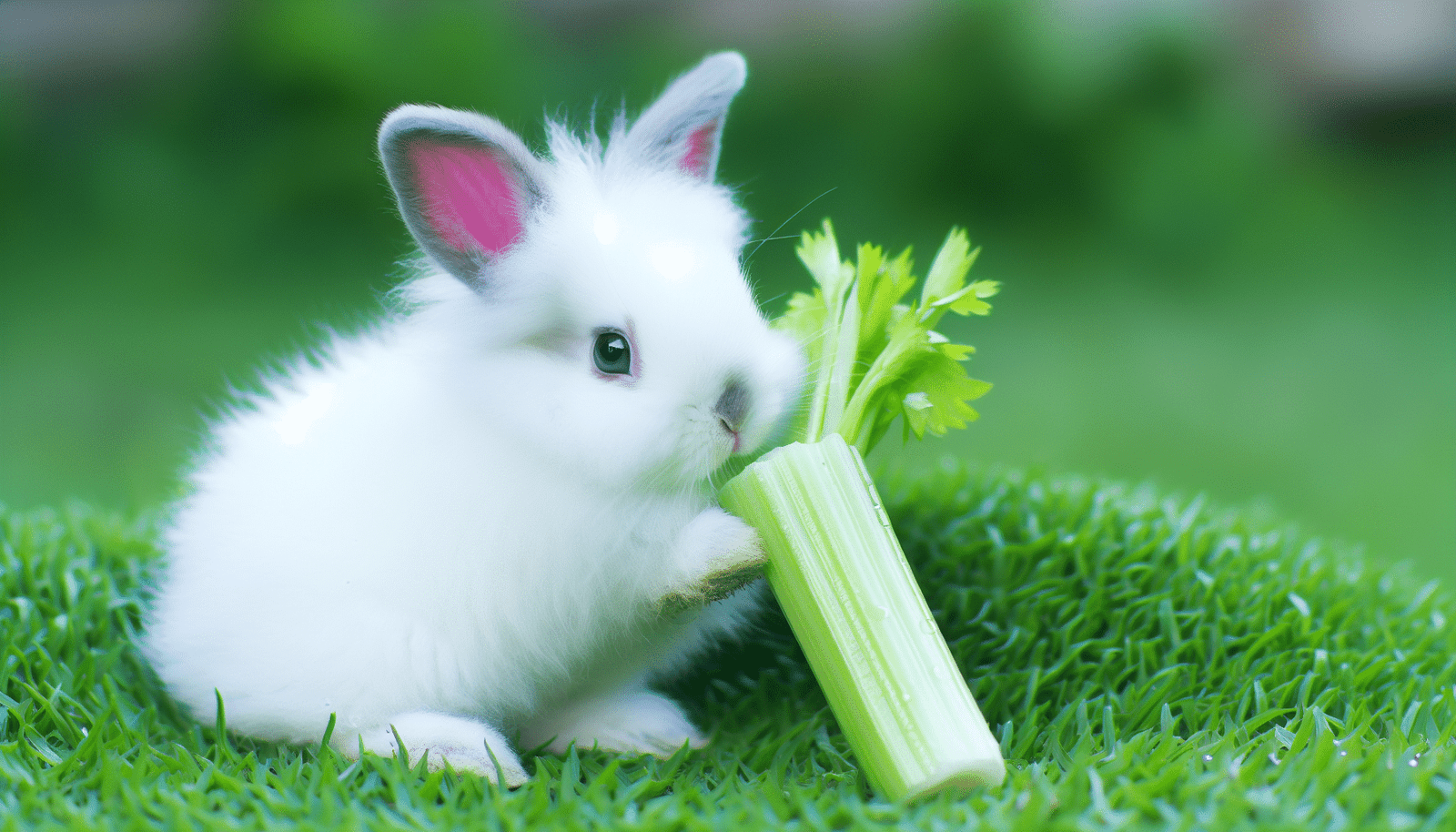
Bunnies and celery, it’s a match made in heaven! Yes, rabbits eat celery safely. This crunchy vegetable is not only a source of entertainment for our hoppy friends but also a provider of essential nutrients like vitamins A and C, fiber, and hydration. The crunchy texture of celery helps wear down their continually growing teeth, an important aspect of a rabbit’s health. However, like introducing any new food to your pet’s diet, celery should be given in moderation and introduced gradually.
So, while rabbits can enjoy munching on celery, it’s essential to understand the nutritional benefits this vegetable offers, along with any potential hazards. After all, we want our furry friends to have the best diet possible, don’t we?
Nutritional Value of Celery for Rabbits
Ever wondered why rabbits seem so drawn to celery? It turns out celery is a nutrient powerhouse for our little friends. It’s packed with essential vitamins like vitamin K, which bolsters bone health, vitamin C, a potent antioxidant, and vitamin A, crucial for vision. So, each time your bunny nibbles on a celery stick, it’s getting a dose of these essential nutrients!
But that’s not all! Celery is also a hydration hero, with a water content of 95%. This keeps our rabbits hydrated, especially important given their need for regular water intake. The vitamins and indigestible fiber found in celery help maintain a rabbit’s digestive system, ensuring regular bowel movements, and helping prevent gastrointestinal stasis. So, adding celery to your rabbit’s diet can support their overall health and digestion.
Potential Hazards of Feeding Celery to Rabbits
While celery is a healthy treat for rabbits, it’s not all sunshine and rainbows. Like every good thing, too much celery can lead to problems. For instance, if celery is introduced into a rabbit’s diet too quickly or in large amounts, it can lead to digestive upset and diarrhea. It’s like eating a whole bag of candy in one sitting – not a great idea!
The long strings in celery can also become a choking hazard if not adequately prepared. It’s like trying to swallow spaghetti without chewing! Additionally, bunnies may have individual sensitivities to vegetables like celery, leading to digestive issues. So, it’s crucial to monitor your pet after introducing celery to their diet, ensuring they don’t exhibit symptoms of food allergies like skin irritations, digestive problems, or lethargy.
How to Properly Feed Celery to Your Bunny
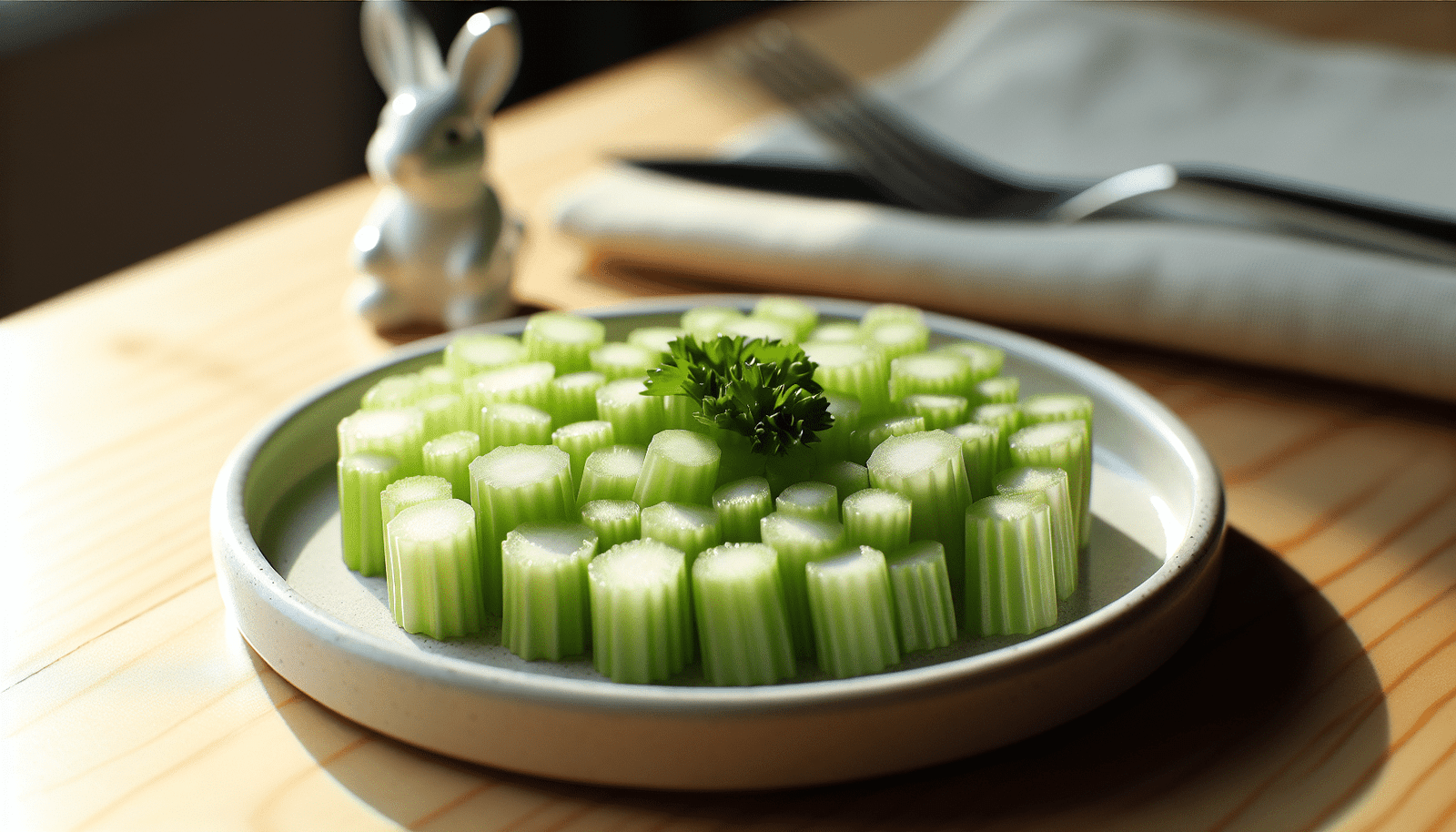
So, you’ve decided to introduce celery into your bunny’s diet. Great choice! But it’s essential to know how to properly feed your furry friend this treat. Like introducing any new food item, start with very small amounts of celery, gradually increasing the quantity over time. This helps their digestive system adjust to the new food and prevents any potential upset.
And remember, a balanced diet is key. While it might be tempting to spoil your rabbit with celery, it’s crucial to provide a balanced diet that includes:
- Hay
- Pellets
- A variety of fresh greens
- Plenty of fresh water
Always keep an eye out for any signs of digestive issues, such as soft poo within 24 hours after consuming new foods like celery.
Cutting Celery into Safe Pieces
Just like you wouldn’t hand your child a whole apple without cutting it into bite-sized pieces, the same goes for your bunny and celery. The stringy parts of celery can get stuck in a rabbit’s teeth or throat, leading to choking, so it’s crucial to remove the strings and cut the celery into small, manageable pieces.
A good rule of thumb is to cut celery sticks into bite-sized pieces, not longer than 2cm or about 1/2 to 1 inch. These small pieces are not only safer for your bunny but also aid in their digestion, minimizing potential digestive issues. So, grab that cutting board and make that celery bunny-safe!
Frequency and Portion Sizes
Now that you’ve got your celery cut into the perfect bite-sized pieces, you might be wondering, “How much celery should I feed my rabbit?” Well, rabbits should not eat more than half a celery stick per day.
Think of celery as the icing on the cake of your bunny’s diet. The bulk of their diet should be hay, with celery serving as a crunchy treat. By limiting the portion size of celery, you can ensure a balanced diet for your rabbit and prevent any nutritional imbalances.
Parts of Celery Suitable for Rabbit Consumption
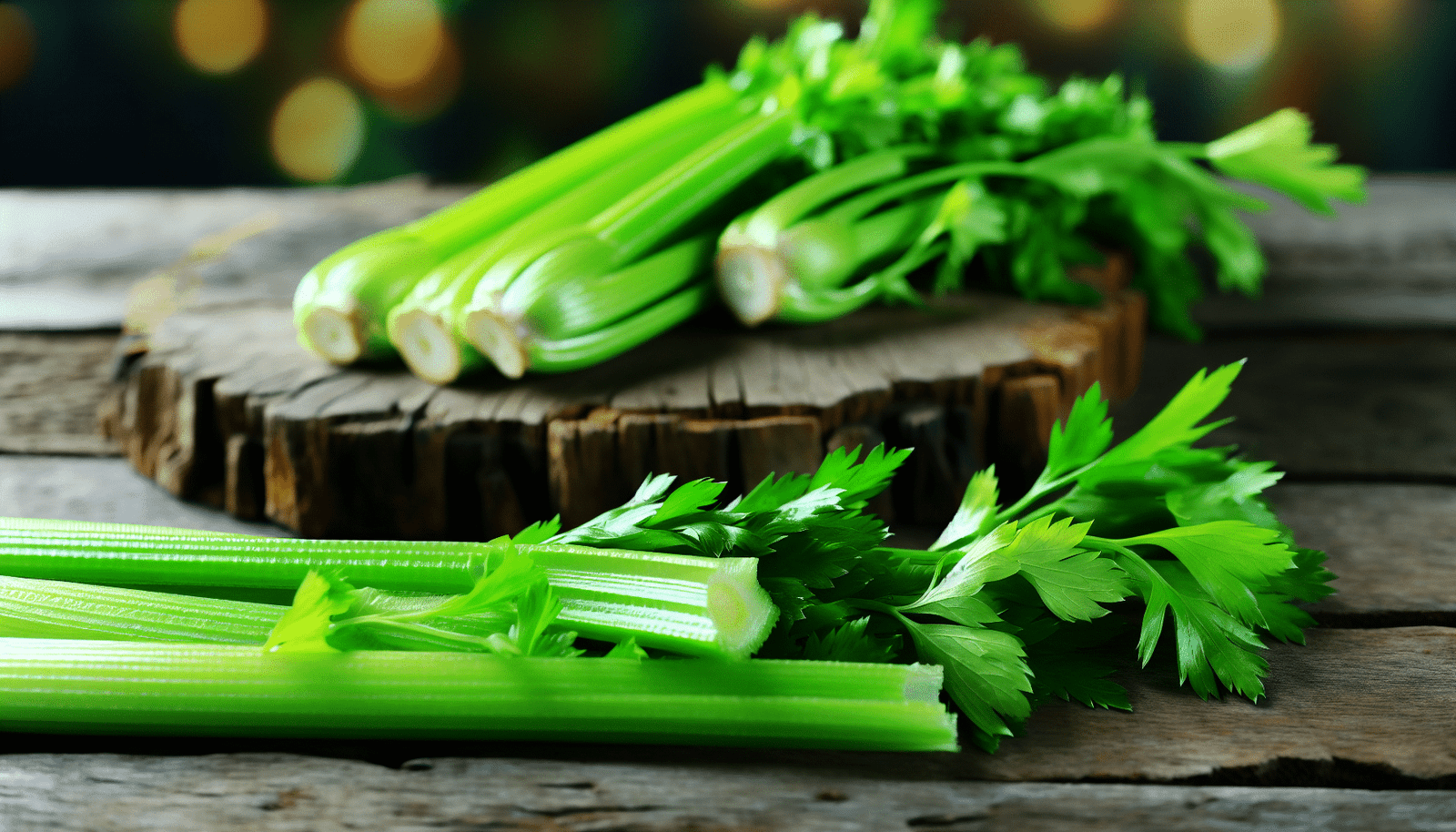
So, we’ve established that rabbits can eat celery. But what parts of the celery plant are safe for rabbits to nibble on? Well, your bunny can safely munch on both the stalks and leaves of the celery, which can be incorporated into their diet as part of the leafy greens they consume.
However, while the stalks and leaves are safe, celery flowers are a no-go for your pet. They are not considered edible or safe for rabbits. So, while incorporating fresh foods like celery contributes to a varied diet enriching their eating experience and promoting hydration, always ensure you’re serving the right parts of the plant.
Celery Leaves and Stalks
Both celery leaves and stalks have their unique benefits for rabbits. Celery leaves can be more nutritious than stalks and do not pose a choking hazard for rabbits. They’re like the superfood of the celery world! In fact, rabbits eat celery leaves as a healthy addition to their diet, making rabbit celery consumption beneficial.
On the other hand, munching on the crunchy texture of celery stalks helps wear down a rabbit’s teeth, a vital aspect of their oral health. While celery leaves are a safer option due to the absence of long fibers, the stalks can still be a healthy part of the rabbit’s diet when prepared properly.
Celery Roots
Celery roots, or celeriac, may not be the first thing that comes to mind when thinking of rabbit food. But these roots are a low-starch, safe, and healthy option for rabbits when fed in limited quantities.
The roots should be peeled before serving, and they can be offered raw to your bunny. Even though celery root is suitable for daily feeding, it should be given only in limited quantities to avoid overfeeding. Just remember, moderation is key!
Alternatives to Celery for Rabbit Snacks
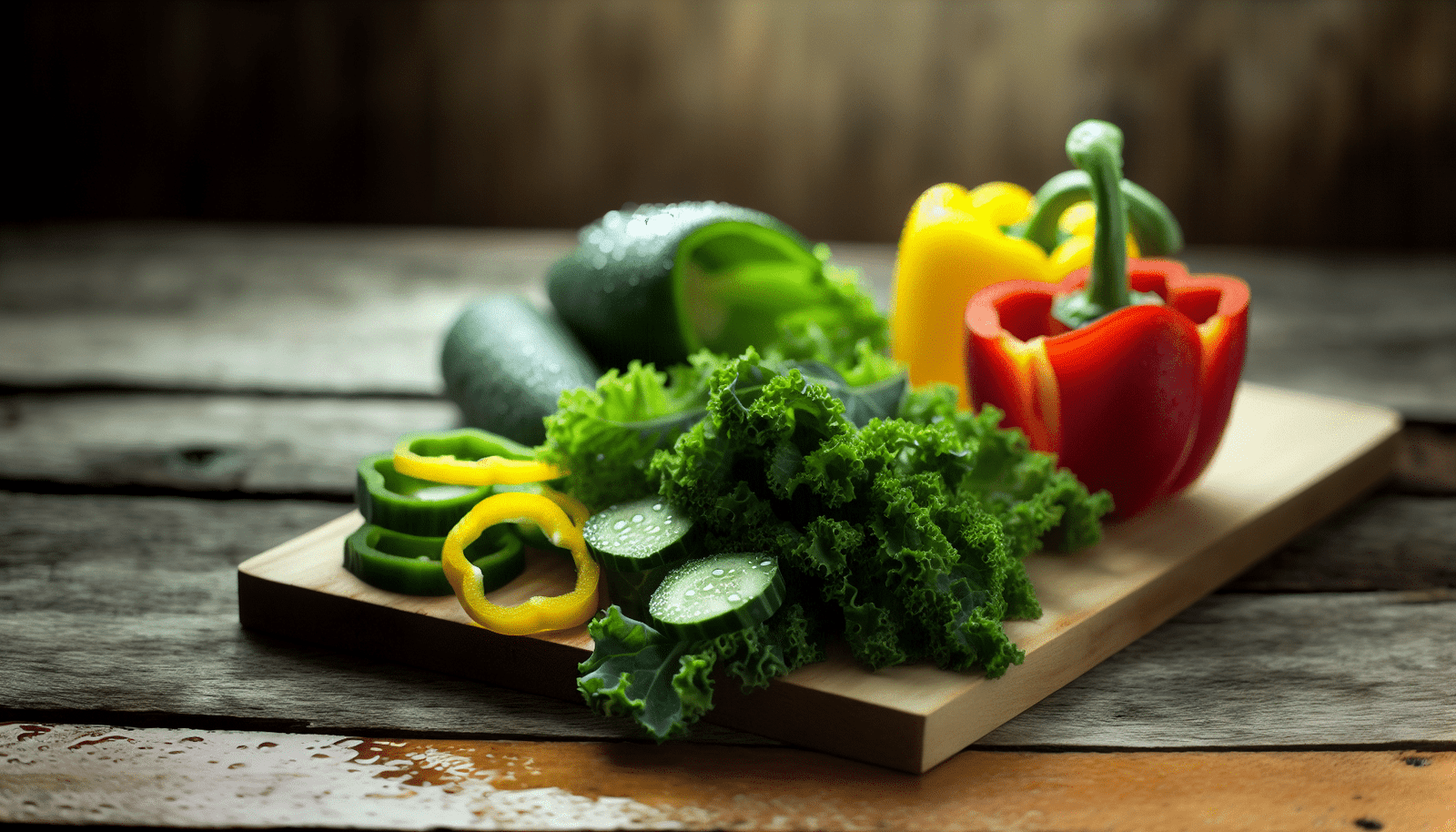
While celery is a fantastic snack for rabbits, variety is the spice of life! Including a mix of vegetables in a rabbit’s diet is beneficial for their health and can contribute to their longevity.
There are many other low-sugar vegetables that are healthy for rabbits, such as:
- kale
- bell peppers
- carrot tops
- bok choy
- brussels sprouts
- herbs like basil
These leafy vegetables, along with occasional treats like tomatoes and cucumbers, can offer a delightful change of pace from their usual diet.
Low-Sugar Vegetables
When it comes to feeding your bunny, not all vegetables are created equal. It’s important to choose those with low sugar content to avoid health issues. Some beneficial low-sugar vegetables for rabbit consumption include:
- kale
- bell peppers
- bok choy
- Brussels sprouts
- herbs like basil
Kale is particularly beneficial due to its high protein content and variety of nutrients while being low in oxalates. So, when you’re thinking of diversifying your bunny’s diet, remember to opt for low-sugar veggies to avoid giving them too much sugar!
Hydrating Foods
In addition to low-sugar veggies, there are also hydrating foods that can serve as occasional treats for rabbits. Cucumbers and watermelon are excellent examples of hydrating foods that can be fed to rabbits as treats.
Watercress and wheatgrass are also excellent hydrating vegetables that provide essential nutrients. They, along with romaine and butter lettuce, can help increase water intake in rabbits. Just remember, like all treats, these hydrating foods should be given in moderation.
Maintaining a Balanced Diet for Your Rabbit
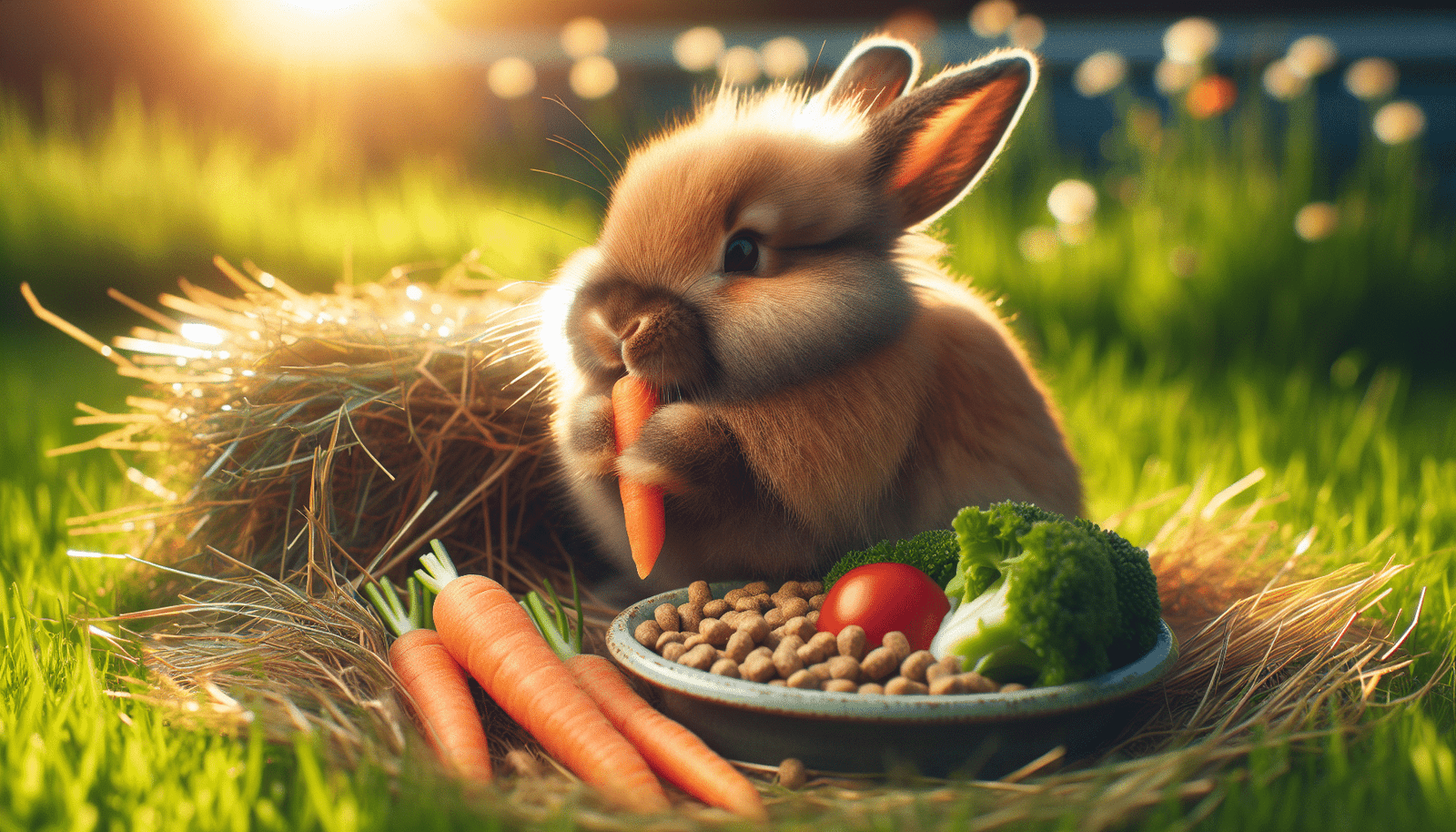
As we’ve learned, a rabbit’s diet can include a variety of foods, but the key lies in the balance. A rabbit’s daily diet should be fiber-rich, primarily consisting of hay or dried or fresh grass, which is essential for a healthy rabbit’s diet.
A balanced diet for a rabbit should include mostly hay, a limited number of pellets, and a small portion of fresh vegetables. Feeding celery, alongside other fresh produce, ensures a balanced diet due to the variety of nutrients provided. So, while it’s fun to provide tasty treats like celery, it’s vital to maintain a balanced diet for your rabbit’s health.
Importance of Hay
Hay is like the bread and butter of a rabbit’s diet, ensuring a rabbit’s healthy lifestyle. It should comprise at least 75% of a rabbit’s diet and needs to be available at all times, both during the day and night.
Hay provides multiple benefits for rabbits, including:
- Aiding proper intestinal function
- Continual wearing down of their constantly growing teeth
- Preventing boredom
- Ensuring nutritional balance
So, when it comes to feeding your bunny, don’t forget the grass hay, as that’s what rabbits eat!
Supplementing with Vegetables and Pellets
While hay should be the mainstay of a pet rabbit’s diet, it’s important to supplement it with vegetables and pellets for pet rabbits. A rabbit’s diet should include a small amount of high-quality pellets to supplement nutrients.
Introducing fresh foods to a baby rabbit should be done gradually, one at a time, to help their gut bacteria adapt properly. Remember, dietary adjustments might be necessary for rabbits with specific needs due to health issues or physiological states, such as pregnancy, so be sure to consult with a vet or qualified pet care specialist.
Special Considerations for Baby Rabbits
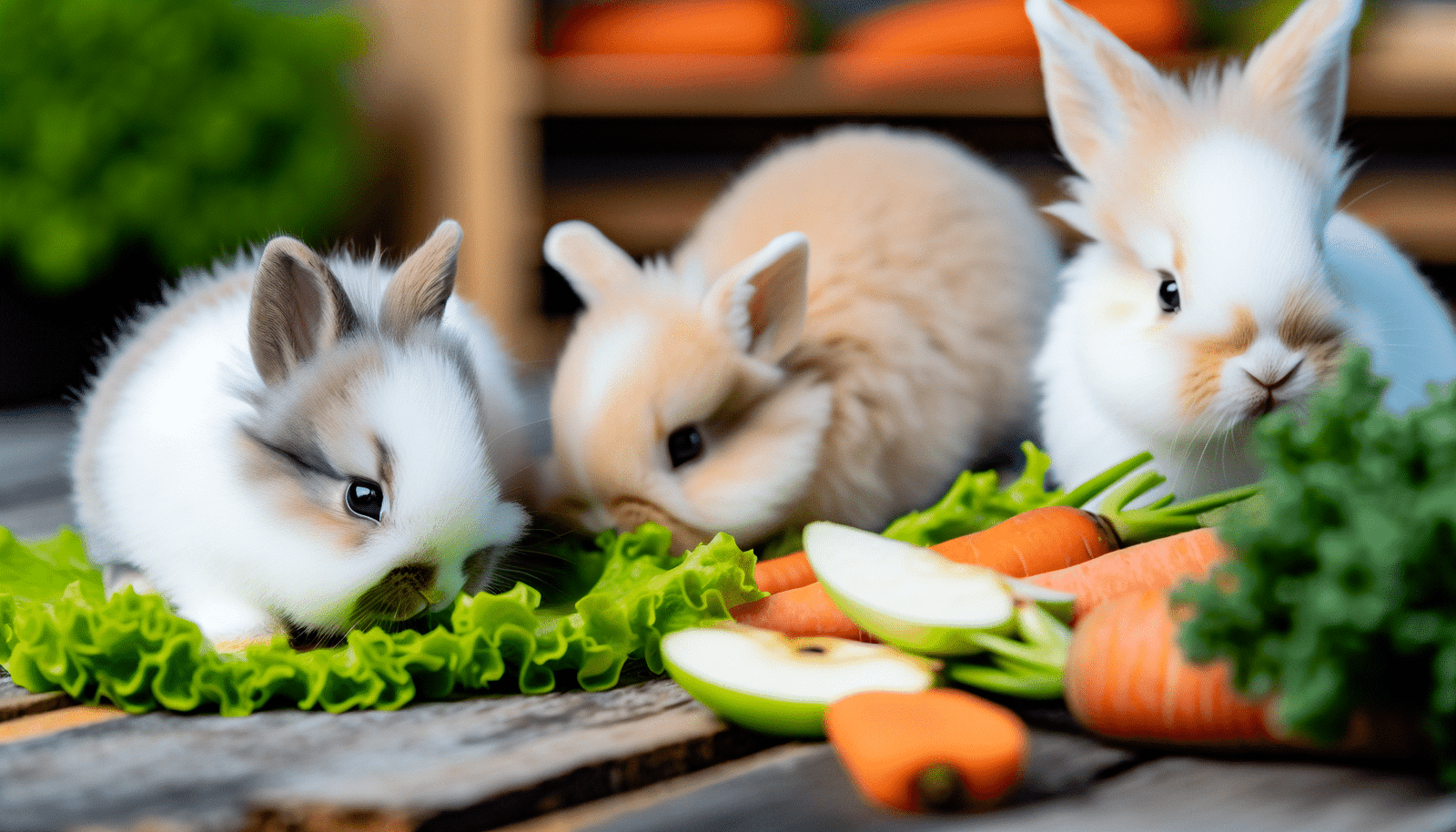
Feeding baby rabbits is a little different from feeding adult rabbits. Here are some guidelines to follow:
- Baby rabbits rely on their mother’s milk until they are 6-8 weeks old.
- From 2-3 weeks old, baby rabbits begin to nibble on solids while still nursing.
- By 3-4 weeks, they transition to a diet similar to their mother’s.
During the weaning period, consistency in diet is crucial as their digestive system adapts from milk to adult solids. Young, pregnant, nursing or ill rabbits have different dietary requirements compared to other rabbits, necessitating specialized diets often advised by a vet.
When to Introduce Celery
So, when is the right time to introduce celery to your baby bunny’s diet? Baby rabbits should be at least 12 weeks old before introducing celery into their diet. Introducing celery to a baby rabbit’s diet too early can lead to digestive issues as their systems are not yet mature enough to handle a variety of foods.
When feeding rabbits celery, just like with adult rabbits, ensure to mix it with hay and other dietary staples to provide a balanced diet and to monitor baby rabbits for any signs of digestive discomfort.
Other Foods for Baby Rabbits
Baby rabbits have a different dietary requirement than adult rabbits. Here is a general timeline for their diet:
- Initial 3 weeks of life: exclusively milk
- 3 to 7 weeks: include alfalfa hay and food pellets
- 12 weeks or two weeks after settling into a new home: introduce fresh foods
During weaning and up until 7-8 months of age, baby rabbits require alfalfa hay and pellets to satisfy the higher protein and calcium needs crucial for their growth. Fresh foods, when introduced at around 3 months of age, should be given one at a time in small pieces to help baby rabbits’ gut bacteria adapt properly.
Summary
So there we have it, folks! We’ve delved into the world of rabbits and celery, exploring the nutritional benefits, potential hazards, and how to properly introduce celery into your bunny’s diet. While celery can be a great addition to a rabbit’s diet, remember, moderation is key. A balanced diet, primarily consisting of hay, supplemented with fresh vegetables, pellets, and the occasional celery treat, will keep your bunny hopping happily for years to come!
Frequently Asked Questions
What vegetables are safe for rabbits?
Stick to feeding your rabbits lettuce, spinach, kale, watercress, broccoli, celery, bell peppers, cabbage, and squash. Avoid feeding them iceberg lettuce, rhubarb, raw onions, leeks, or garlic.
Do rabbits eat watermelon?
Yes, rabbits can eat watermelon, but it should be given in moderation without the rind and seeds to prevent health issues. It’s best to prioritize a balanced diet of hay and fresh vegetables.
Can bunnies eat cucumbers?
Yes, bunnies can eat cucumbers, but it’s best to offer them in moderation to avoid potential digestive issues. Enjoyed occasionally, cucumbers can make a refreshing treat for rabbits.
Can bunnies eat bananas?
Yes, bunnies can eat bananas, but they should be given as an occasional treat due to their high sugar content. Moderation is key for their overall health and well-being.
Is celery safe for bunnies?
Yes, celery is safe for bunnies and can be a healthy addition to their diet, providing essential vitamins, minerals, and fiber to support their digestion and hydration.



